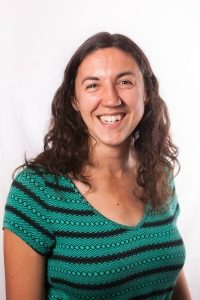Mennonite Health Journal
Articles on the intersection of faith and health
Faith at Work: Annual Gathering 2014 at Laurelville
Kayla Berkey
from Mennonite Health Journal, Vol. 16, No. 3 – August 2014
Our faith moves us to new places, new ideas, and new visions. This idea was a focus of the Annual Gathering 2014 of Mennonite Healthcare Fellowship (MHF) that took place June 13-15 at Laurelville Mennonite Church Center, Mt. Pleasant, Pennsylvania. The weekend’s speakers shared challenging and heartfelt explorations of how God is calling, moving, guiding, and sending people of faith throughout the healthcare field.
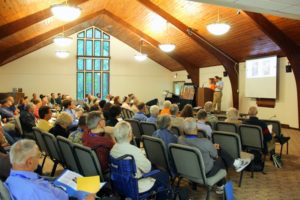 “Sometimes God moves us geographically, and sometimes God moves us into new vision for the neighborhoods where we are already located,” Jen Leaman shared in the Saturday morning worship session where she and her husband Tim were speakers.
“Sometimes God moves us geographically, and sometimes God moves us into new vision for the neighborhoods where we are already located,” Jen Leaman shared in the Saturday morning worship session where she and her husband Tim were speakers.
Tim and Jen Leaman’s story powerfully described how their faith guided their decision to move with their three children into the rapidly growing and ethnically diverse Oxford Circle neighborhood of Philadelphia where Tim grew up.
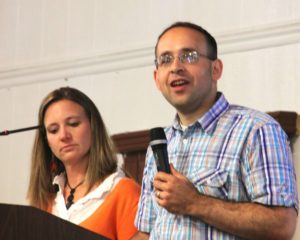 Tim is a family physician and a site medical director at Esperanza Health Center in another neighborhood of Philadelphia, and Jen is a trained social worker who volunteers regularly in their children’s public schools. Both are actively involved with Oxford Circle Mennonite Church’s ministries and its non-profit community development corporation, which offers community programs and resources.
Tim is a family physician and a site medical director at Esperanza Health Center in another neighborhood of Philadelphia, and Jen is a trained social worker who volunteers regularly in their children’s public schools. Both are actively involved with Oxford Circle Mennonite Church’s ministries and its non-profit community development corporation, which offers community programs and resources.
The Leamans chose to move into the Oxford Circle neighborhood because, beyond programs, they wanted to invest in the community as their home: “We can more readily engage with our neighbors in the daily work of building a healthy community by using its schools, by playing in its parks,” Tim explained. “May we increasingly be a people who do not plan only the things we can do ourselves,” the Leamans offered as a prayer and challenge for the group. (Read an abridged version of their presentation elsewhere in this issue.)
Tim and Jen Leaman were just two presenters at the MHF Annual Gathering who offered valuably different perspectives relating their faith with healthcare disciplines. The shared motivation to live out their faith in their life as healthcare professionals brought together a diverse group of persons from Texas to New York. The variety of occupations represented included physicians, nurses, social workers, dieticians, chaplains, dental and medical students.
Scott Holland Professor of Theology & Culture and Director of Peace Studies at Bethany Theological Seminary in Richmond, Indiana, kicked off the weekend event sharing stories of God’s calling into the healing, reconciling work of God’s reign. Holland, who divides his time between Richmond and his home near Pittsburgh, is a Peace Church representative and theological consultant to the World Council of Churches, an assignment that has taken led him across Africa, Asia, Europe and the Americas for the work of overcoming violence and seeking cultures of peace.
Many attendees at the MHF Annual Gathering have spent time overseas, and many of the weekend speakers referred to their cross-cultural experiences as formative for shaping their vocational goals.
Indeed, the roots of MHF run deep into international medical mission work, noted MHF Executive Director Paul Leichty. Both predecessor organizations, Mennonite Medical Association (MMA) and Mennonite Nurses Association (MNA) had their early meetings in conjunction with mission board meetings. In more recent years, as hospitals and clinics in developing countries are turned over to locally trained physicians, medical missions have shifted away from overseas work. MHF members today demonstrate a shift toward creative involvement in missions in their local communities.
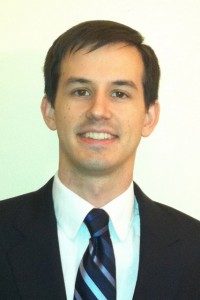 One way that MHF continues to creatively support cross-cultural experience is through an enhanced Student Elective Term (SET) program. Each year, scholarships are made available for graduate-level students in any healthcare-related field who seek to gain a 4-8 week term of healthcare experience in a mission setting in a developing country.
One way that MHF continues to creatively support cross-cultural experience is through an enhanced Student Elective Term (SET) program. Each year, scholarships are made available for graduate-level students in any healthcare-related field who seek to gain a 4-8 week term of healthcare experience in a mission setting in a developing country.
John Stoeckle, a first-year family medicine resident at Thomas Jefferson University, gave a workshop presentation about his recent SET experience working with malaria research at Macha Mission Hospital in Zambia. “The experience informs both our faith and our careers for the rest of our lives,” Stoeckle said.
Other workshops which followed the Saturday morning plenary session and extended into the afternoon reflected the diversity of ways in which people work out their faith in the healthcare field.
Tim and Jen Leaman followed up their morning presentation by offering participants a further opportunity to reflect on the ways the Spirit moves us into areas where God is already at work in the world.
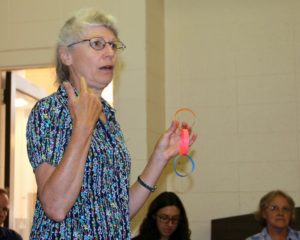
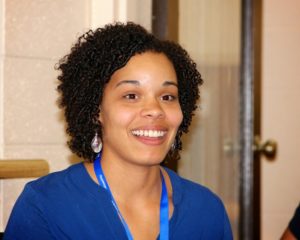 Mary Beth Lind, a dietician who grows much of her own food, and Charity Grimes Bauman, the Outreach Coordinator for a mobile gardening program at Phipps Conservatory in Pittsburgh, teamed up in a workshop that addressed people’s access to healthy food. The two shared their unique rural and urban perspectives about the essential need to combine access to healthy foods with education to encourage people to lead healthy lifestyles.
Mary Beth Lind, a dietician who grows much of her own food, and Charity Grimes Bauman, the Outreach Coordinator for a mobile gardening program at Phipps Conservatory in Pittsburgh, teamed up in a workshop that addressed people’s access to healthy food. The two shared their unique rural and urban perspectives about the essential need to combine access to healthy foods with education to encourage people to lead healthy lifestyles.
Randall Longenecker and Oralea Pittman led in yet another workshop which guided participants in thinking about how healthcare professionals pass on knowledge and cultivate the learned skills among their colleagues. Longenecker, a physician, and Pittman, a nurse practitioner, have collaborated in teaching and practice for fourteen years. They shared how even the language that is used, whether “mentor, coach or facilitator,” can make a difference in how teachers share their experiences as part of a learning community of students, residents, and practitioners.
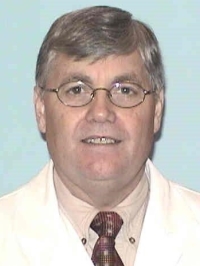 In another workshop, Melvin Janzen, who has served as a staff chaplain at two university hospitals, discussed his approach to walking people through the struggles they often face during illness or injury. As Janzen reflected on how healthcare professionals live out their faith in large secular settings, he noted how physical health crises can also be the occasions for growth and healing in the realm of mental and spiritual health. “I have a growing sense that being a chaplain is to waken people’s inner resources, their dormant spirituality,” he explained.
In another workshop, Melvin Janzen, who has served as a staff chaplain at two university hospitals, discussed his approach to walking people through the struggles they often face during illness or injury. As Janzen reflected on how healthcare professionals live out their faith in large secular settings, he noted how physical health crises can also be the occasions for growth and healing in the realm of mental and spiritual health. “I have a growing sense that being a chaplain is to waken people’s inner resources, their dormant spirituality,” he explained.
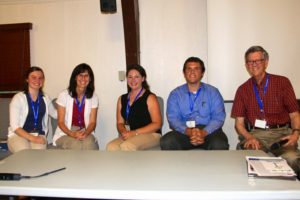 On Saturday evening, a panel that included a diversity of ages and occupations reflected on some of the tension points in their faith and vocations. Joe Longacher, a retired physician and the President of the Board of MHF, stimulated panelists with some challenging questions which led to some heartfelt and compelling responses about how their faith and convictions led them to making some difficult decisions. Lyubov Slashcheva, a dental student at Virginia Commonwealth University, discussed the challenge of choosing to supplement her studies with community volunteer work and having to defend this decision to professors who felt this might interfere with her coursework. Kristine Kopp Charles shared the difficult decision she made to leave her OB/GYN position of sixteen years at a point where it seemed it would interfere with her family life. Her decision has led to a current period in her life as she searches and re-thinks her vocational calling. Andrea Bieber offered her experience working within the behavioral health field, especially as she supervises others. Jonathan Spicher, a medical student, shared from his experiences which led to his entering the medical field.
On Saturday evening, a panel that included a diversity of ages and occupations reflected on some of the tension points in their faith and vocations. Joe Longacher, a retired physician and the President of the Board of MHF, stimulated panelists with some challenging questions which led to some heartfelt and compelling responses about how their faith and convictions led them to making some difficult decisions. Lyubov Slashcheva, a dental student at Virginia Commonwealth University, discussed the challenge of choosing to supplement her studies with community volunteer work and having to defend this decision to professors who felt this might interfere with her coursework. Kristine Kopp Charles shared the difficult decision she made to leave her OB/GYN position of sixteen years at a point where it seemed it would interfere with her family life. Her decision has led to a current period in her life as she searches and re-thinks her vocational calling. Andrea Bieber offered her experience working within the behavioral health field, especially as she supervises others. Jonathan Spicher, a medical student, shared from his experiences which led to his entering the medical field.
Weekend participants not only talked about their faith but expressed it in song and spoken word as Jim and Angie Clemens from Dayton, Virginia led in a meaningful time of worship at each plenary session. Following the Saturday evening session and an ice cream social, the Clemens couple led a rousing hymnsing featuring selections of the attendees present.
Sunday morning capped off the Annual Gathering as Melvin Janzen shared a message based upon the apostle Paul’s farewell message in Acts 13. “Out of Headache and Heart Ache, a Message of Encouragement” emerges, said Janzen. The service culminated with a celebration of the Lord’s Supper led by MHF Board member, Kenton Derstine, a chaplain and faculty member of Eastern Mennonite Seminary.
The weekend-long MHF Annual Gathering also provided plenty of informal space for people in healthcare disciplines to connect, network, support each other, and learn. The networking and fellowship that took place during informal time allowed people to discuss their current projects and catch up with one another. Attendees at the gathering represented many different kinds of programs.
Elizabeth Beels came to the gathering with a photo album from a recent trip to Nepal with a group of eleven Goshen College nursing students. Having worked as a nurse in Nepal, she returned to the U.S. and realized that she was dealing with post-traumatic stress disorder (PTSD) from some of her experiences during her time there. Taking the students felt a way for her to grieve and recover. “I felt a relief in passing the torch of my experiences onward,” she said.
James Nelson Gingerich, a physician at Maple City Health Care Center (MCHCC) in Goshen, Indiana, came to the gathering as a way to network and connect with other physicians. As someone interested in peace, justice, and community development, he sees community healthcare centers as an entry point into communities. MCHCC works at incorporating innovative programs, including one where people can earn credits from volunteering at community agencies toward the cost of their medical bulls.
Leichty seeks for the Annual Gathering to capture and strengthen links between people’s faith and their professional lives: “Together we can encourage each other, support each other in living out our faith, and raise some new possibilities for how the church can use the gifts of people in the healthcare field.”

